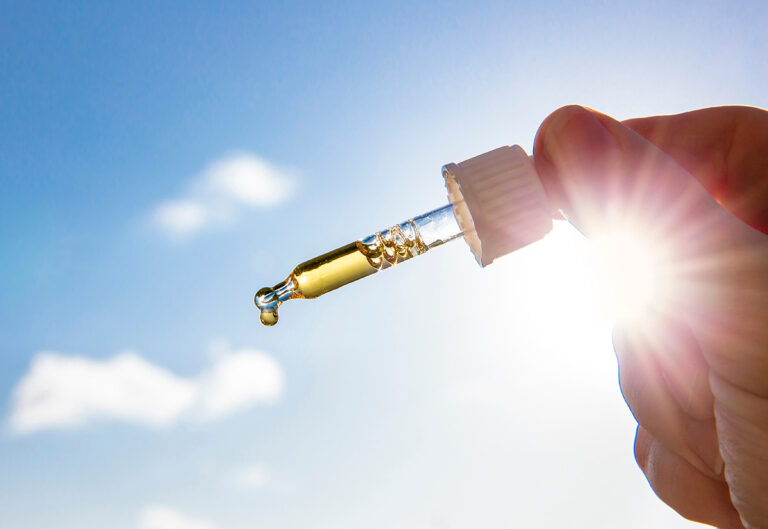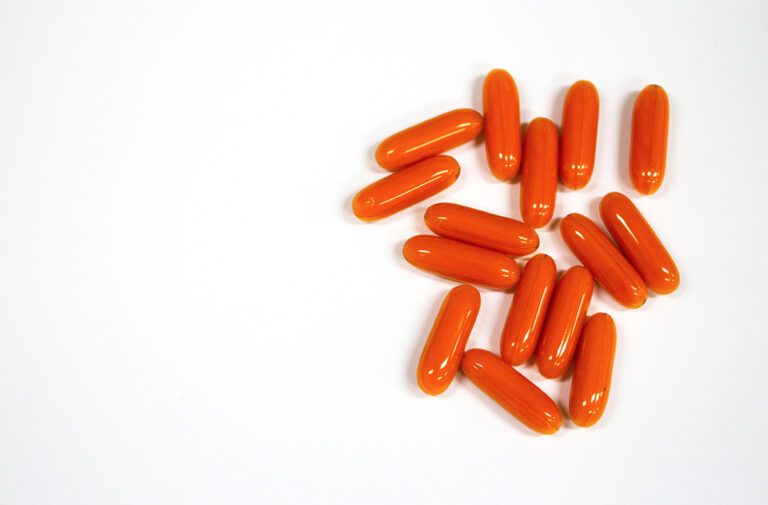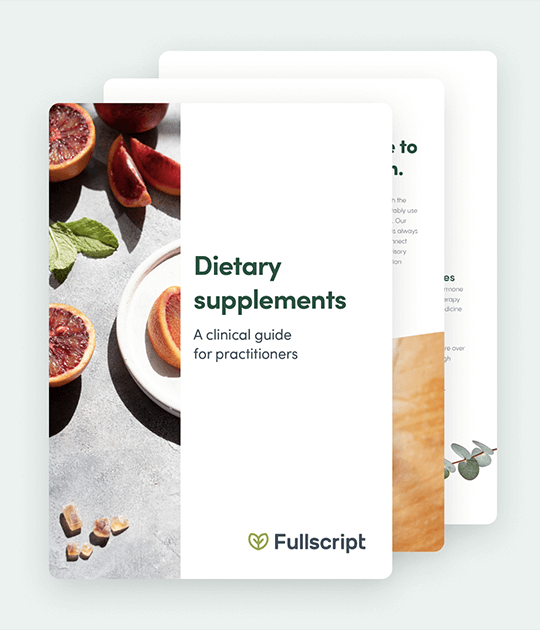
Glutathione levels decrease naturally as you age.
What Is Glutathione?
Arguably the most important antioxidant in the body, glutathione protects cells from the damaging consequences of reactive oxygen species, toxins, and heavy metals. (10)(11) Sometimes referred to as the “master antioxidant,” glutathione is produced endogenously, meaning it is synthesized by the body. Glutathione synthesis requires three amino acids, which include glutamate, cysteine, and glycine. (11) In your cells, glutathione exists as either reduced (GSH) or oxidized (GSSG) glutathione. The ratio between these two forms serves as an indicator of cellular health. In healthy individuals, the ratio between GSH and GSSG is close to 1:100. In contrast, cells experiencing oxidative stress will have increased oxidized glutathione and a ratio of 1:10. (27) Maintaining high glutathione concentrations and an appropriate GSH/GSSG ratio has been shown to not only protect cells from oxidative stress and damage but prevent tissue degeneration and slow disease progression as well. Numerous factors can negatively influence glutathione production, including poor diet, (11) infection, aging, (37) and toxin exposure. (27)Benefits of Glutathione
Thanks to its cytoprotective (cell protecting) effects, glutathione may delay or slow the progression of certain chronic diseases. (11) Although much of the research examining the effects of glutathione is conducted in animal subjects, existing research suggests that glutathione has a significant effect on immune health and various chronic conditions. (18) Here are the benefits of glutathione:Supports Immune System Function
Glutathione plays an essential role in regulating the innate immune system, the body’s first line of defense against harmful pathogens. (10) It promotes a robust immune system by protecting host immune cells from oxidative damage and supporting the activity of lymphocytes and other immune cells in the body. (29) Much of the scientific literature concludes that low levels of glutathione can have detrimental effects on the immune system, including increasing an individual’s susceptibility to infection. Even small changes in glutathione levels can have significant implications on immune cells and immune system function. (5) Some research has indicated a connection between diminished glutathione levels and susceptibility to viral infection, such as the flu. (10) In vitro and in vivo studies also suggest that glutathione may exert antiviral effects. (2)(24) Furthermore, glutathione has the potential to reduce the severity of symptoms related to various autoimmune conditions, such as rheumatoid arthritis, celiac disease, and lupus. (8) According to one study, glutathione supplementation reduced oxidative stress and inflammation, two factors that contribute to autoimmune conditions. (26)Did you know? Glutathione has been shown to help with the treatment of HIV and AIDS by replenishing glutathione levels and improving immune system function. (4)
Reduces Inflammation
Increased oxidative stress is directly linked to increased inflammation and risk of numerous chronic conditions. (11) Glutathione is believed to inhibit the inflammatory response and prevent the production of inflammatory cytokines that can contribute to chronic disease. (10) When glutathione levels are too low, oxidative stress can cause harm. Glutathione depletion, not to be confused with the rare genetic condition glutathione synthetase deficiency that prevents the body from producing glutathione, (34) may contribute to the following conditions:- Alzheimer’s and Parkinson’s disease
- Cancer
- Chronic obstructive pulmonary disease (COPD)
- Cystic fibrosis (10)
- Heart disease
- HIV and AIDS
- Liver disease
- Obesity
- Protein-energy malnutrition (PEM)
- Type 2 diabetes (11)
How to Boost Glutathione Levels Naturally
Small adjustments to your daily habits, such as eating a healthy diet or getting enough exercise, may help maintain or improve glutathione levels. Here’s how to boost your glutathione levels naturally:
Failing to get enough quality sleep can impact your glutathione levels.
Get Enough Sleep
Short-term and chronic lack of sleep can promote oxidative stress and deplete glutathione levels. (7)(33) In an animal study, deprivation of rapid eye movement sleep, a phase of deep sleep characterized by increased brain activity, resulted in significant reductions of glutathione in the brain. (19) The National Sleep Foundation recommends that adults get between seven and nine hours of sleep per night. (31) Download a handout on sleep hygiene.Eat a Healthy Diet
The Mediterranean diet, which promotes consuming an abundance of fruits, vegetables, nuts, seeds, fish, and olive oil, has been shown to improve GSH/GSSG ratios. Similar to the Mediterranean diet, the Dietary Approaches to Stop Hypertension (DASH) diet, which emphasizes consumption of healthy carbohydrates and fats, has also been shown to improve glutathione levels. (11)Did you know? The Standard American Diet, consisting of highly processed foods, excess sugar, and fat, has been shown to impair glutathione synthesis. (11)
Eat Sulfur-Rich Foods
One of the sulfur-containing amino acids needed for glutathione synthesis, cysteine, is not stored in the body and, therefore, must be consumed in the diet regularly. Without adequate intake of cysteine, the body depletes glutathione, thus impairing antioxidant defenses. (23) This amino acid is primarily found in high-protein foods, including poultry, meat, fish, and soybeans. (36) Furthermore, consuming foods rich in sulfur-containing compounds known as glucosinolates has been shown to increase glutathione levels. Research indicates that eating sulfur-rich cruciferous vegetables, such as broccoli, Brussels sprouts, and cabbage, may reduce oxidative stress by increasing the body’s glutathione levels. (1)(21)
Consuming sulfur-rich foods, such as broccoli, Brussels sprouts, and cabbage, can help promote glutathione synthesis.
Limit Alcohol Consumption
Alcohol can have damaging effects on the liver, particularly when consumed in excess. Several studies have determined a correlation between chronic alcohol abuse and depleted glutathione in the liver and other tissues. (17)(37)Exercise Regularly
Research suggests that regular exercise may improve your body’s natural antioxidant defense system and boost glutathione levels. According to one study, participants who exercised three times per week for 40 minutes had higher glutathione levels than the control group that didn’t exercise. (6)Dietary Supplements for Boosting Glutathione
Beyond dietary and lifestyle modifications, supplementing with exogenous glutathione or glutathione precursors may help improve or preserve your levels. See dietary supplements for boosting glutathione levels below:Glutathione Supplements
Exogenous glutathione can be administered in numerous ways, including orally, sublingually, intravenously, transdermally, and via inhalation. Of these methods, oral supplementation is the most convenient; however, studies examining the efficacy of oral supplementation for improving glutathione levels and oxidative stress are inconclusive and more research is needed. (11) In a randomized, double-blinded, placebo-controlled trial, oral glutathione was shown to reduce oxidative stress and GSH/GSSG ratios. After six months, the group receiving a low dose saw average improvements of 17 to 29% in glutathione levels in erythrocytes, plasma, and lymphocytes, whereas the high-dose group saw improvements of 30 to 35%. (28) As an alternative to exogenous glutathione, supplementing with glutathione precursors, such as certain micronutrients and protein, appear to be more effective in improving glutathione levels. (11)N-acetylcysteine
N-acetylcysteine (NAC) is a precursor to cysteine, one of the amino acids the body needs to synthesize glutathione. (20) Studies indicate that supplementing with NAC can help preserve and replenish glutathione. (20)(30) In a trial involving 100 subjects with varying baseline glutathione levels, 30 days of twice-daily NAC supplementation was shown to improve glutathione concentrations and reduce systemic oxidative stress in the group that began the trial with low glutathione. (25)Disclaimer: The U.S. Food and Drug Administration (FDA) recently adopted a position prohibiting supplement manufacturers from marketing N-acetyl-L-cysteine (NAC) products as dietary supplements. At this time, all NAC products will remain available through the Fullscript catalog. Fullscript will be closely following the Council for Responsible Nutrition (CRN) and the FDA for guidance and will not be removing NAC from the catalog until it is mandated. Fullscript’s quality team is continuing to monitor this situation, and should any changes occur, Fullscript will promptly notify practitioners.
Whey Protein
Consuming foods rich in cysteine, such as whey protein, may promote glutathione synthesis, induce antioxidant defenses, and reduce inflammation. According to one study, participants who consumed whey protein for five days experienced an increase in serum glutathione levels compared to subjects receiving casein. (3)Vitamin C
Similar to glutathione, vitamin C acts as an antioxidant that helps neutralize free radicals and protect the body’s cells. Consuming enough vitamin C, whether via diet or in combination with supplements, may also improve glutathione concentrations. Research suggests that vitamin C scavenges a larger percentage of free radicals, thus sparing glutathione. (16) In one study, lymphocyte (white blood cell) glutathione levels increased by 18% after supplementing with vitamin C for 13 weeks. Another trial noted that vitamin C supplementation increased red blood cell glutathione levels by an average of 50%. (13)Vitamin E
Vitamin E, an antioxidant naturally found in nuts, seeds, and leafy greens, (22) has protective effects on glutathione-dependent enzymes. Glutathione-dependent enzymes, such as glutathione S-transferases, help catalyze glutathione conjugation for the purpose of detoxification. (35) In a double-blind clinical trial, participants receiving vitamin E supplements for three months experienced an increase in glutathione levels. (12)The Bottom Line: Glutathione Is Essential for a Healthy Immune System
No matter your current health status, maintaining and replenishing glutathione is essential for promoting a healthy immune system and fending off oxidative damage from free radicals. By making lifestyle modifications, such as getting enough restful sleep, eating well, and incorporating dietary supplements when advised by your integrative medical practitioner, you can help your body synthesize glutathione naturally.Help more patients.
right in your Fullscript account!
New to Fullscript? Sign up now.
- Bogaards, J. J. P., Verhagen, H., Willems, M. I., Poppel, G., & Bladeren, P. J. (1994). Consumption of Brussels sprouts results in elevated α-class glutathione s-transferase levels in human blood plasma. Carcinogenesis, 15(5), 1073–1075.
- Cai, J., Chen, Y., Seth, S., Furukawa, S., Compans, R. W., & Jones, D. P. (2003). Inhibition of influenza infection by glutathione. Free Radical Biology and Medicine, 34(7), 928–936.
- de Aguilar-Nascimento, J. E., Prado Silveira, B. R., & Dock-Nascimento, D. B. (2011). Early enteral nutrition with whey protein or casein in elderly patients with acute ischemic stroke: A double-blind randomized trial. Nutrition, 27(4), 440–444.
- De Rosa, S. C., Zaretsky, M. D., Dubs, J. G., Roederer, M., Anderson, M., Green, A., Mitra, D., Watanabe, N., Nakamura, H., Tjioe, I., Deresinski, S. C., Moore, W. A., Ela, S. W., Parks, D., Herzenberg, L. A., & Herzenberg, L. A. (2000). N-acetylcysteine replenishes glutathione in HIV infection. European Journal of Clinical Investigation, 30(10), 915–929.
- Dröge, W., & Breitkreutz, R. (2000). Glutathione and immune function. Proceedings of the Nutrition Society, 59(4), 595–600.
- Elokda, A. S., & Nielsen, D. H. (2007). Effects of exercise training on the glutathione antioxidant system. European Journal of Cardiovascular Prevention & Rehabilitation, 14(5), 630–637.
- Everson, C. A., Laatsch, C. D., & Hogg, N. (2005). Antioxidant defense responses to sleep loss and sleep recovery. American Journal of Physiology-Regulatory, Integrative and Comparative Physiology, 288(2), R374–R383.
- Ferretti, G., Bacchetti, T., Masciangelo, S., & Saturni, L. (2012). Celiac disease, inflammation and oxidative damage: A nutrigenetic approach. Nutrients, 4(4), 243–257.
- Forman, H. J., Zhang, H., & Rinna, A. (2009). Glutathione: Overview of its protective roles, measurement, and biosynthesis. Molecular Aspects of Medicine, 30(1–2), 1–12.
- Ghezzi, P. (2011). Role of glutathione in immunity and inflammation in the lung. International Journal of General Medicine, 4, 105–113.
- Gould, R. L., & Pazdro, R. (2019). Impact of supplementary amino acids, micronutrients, and overall diet on glutathione homeostasis. Nutrients, 11(5), 1056.
- Jain, S. K., McVie, R., & Smith, T. (2000). Vitamin E supplementation restores glutathione and malondialdehyde to normal concentrations in erythrocytes of type 1 diabetic children. Diabetes Care, 23(9), 1389–1394.
- Johnston, C. S., Meyer, C. G., & Srilakshmi, J. C. (1993). Vitamin C elevates red blood cell glutathione in healthy adults. The American Journal of Clinical Nutrition, 58(1), 103–105.
- Jozefczak, M., Remans, T., Vangronsveld, J., & Cuypers, A. (2012). Glutathione is a key player in Metal-Induced oxidative stress defenses. International Journal of Molecular Sciences, 13(3), 3145–3175.
- Kadry, M. O. (2019). Liposomal glutathione as a promising candidate for immunological rheumatoid arthritis therapy. Heliyon, 5(7), e02162.
- Lenton, K. J., Sané, A. T., Therriault, H., Cantin, A. M., Payette, H., & Wagner, J. R. (2003). Vitamin C augments lymphocyte glutathione in subjects with ascorbate deficiency. The American Journal of Clinical Nutrition, 77(1), 189–195.
- Loguercio, C., Piscopo, P., Guerriero, C., Girolamo, V. D., Disalvo, D., & Del Vecchio Blanco, C. (1996). Effect of alcohol abuse and glutathione administration on the circulating levels of glutathione and on antipyrine metabolism in patients with alcoholic liver cirrhosis. Scandinavian Journal of Clinical and Laboratory Investigation, 56(5), 441–447.
- Lomaestro, B. M., & Malone, M. (1995). Glutathione in health and disease: Pharmacotherapeutic issues. Annals of Pharmacotherapy, 29(12), 1263–1273.
- Mathangi, D. C., Shyamala, R., & Subhashini, A. S. (2012). Effect of REM sleep deprivation on the antioxidant status in the brain of wistar rats. Annals of Neurosciences, 19(4), 161–164.
- Mokhtari, V., Afsharian, M. P., Shahhoseini, M., Kalantar, S. M., & Moini, A. (2016). A review on various uses of N-Acetyl cysteine. Cell Journal, 19(1), 11–17.
- Moore, L. E., Brennan, P., Karami, S., Hung, R. J., Hsu, C., Boffetta, P., Toro, J., Zaridze, D., Janout, V., Bencko, V., Navratilova, M., Szeszenia-Dabrowska, N., Mates, D., Mukeria, A., Holcatova, I., Welch, R., Chanock, S., Rothman, N., & Chow, W.-H. (2007). Glutathione s-transferase polymorphisms, cruciferous vegetable intake and cancer risk in the central and eastern European kidney cancer study. Carcinogenesis, 28(9), 1960–1964.
- National Institutes of Health. (2020). Vitamin E. https://ods.od.nih.gov/factsheets/VitaminE-HealthProfessional/
- Nimni, M. E., Han, B., & Cordoba, F. (2007). Are we getting enough sulfur in our diet? Nutrition & Metabolism, 4(1), 24.
- Palamara, A. T., Brandi, G., Rossi, L., Millo, E., Benatti, U., Nencioni, L., Iuvara, A., Garaci, E., & Magnani, M. (2004). New synthetic glutathione derivatives with increased antiviral activities. Antiviral Chemistry and Chemotherapy, 15(2), 77–85.
- Paschalis, V., Theodorou, A. A., Margaritelis, N. V., Kyparos, A., & Nikolaidis, M. G. (2018). N-acetylcysteine supplementation increases exercise performance and reduces oxidative stress only in individuals with low levels of glutathione. Free Radical Biology and Medicine, 115, 288–297.
- Perricone, C., De Carolis, C., & Perricone, R. (2009). Glutathione: A key player in autoimmunity. Autoimmunity Reviews, 8(8), 697–701.
- Pizzorno, J. (2014). Glutathione! Integrative Medicine, 13(1), 8–12.
- Richie, J. P., Nichenametla, S., Neidig, W., Calcagnotto, A., Haley, J. S., Schell, T. D., & Muscat, J. E. (2014). Randomized controlled trial of oral glutathione supplementation on body stores of glutathione. European Journal of Nutrition, 54(2), 251–263.
- Rodrigues, C., & Percival, S. (2019). Immunomodulatory effects of glutathione, garlic derivatives, and hydrogen sulfide. Nutrients, 11(2), 295.
- Shackebaei, D., King, N., Shukla, B., & Suleiman, M.-S. (2005). Mechanisms underlying the cardioprotective effect of l-cysteine. Molecular and Cellular Biochemistry, 277(1–2), 27–31.
- Sleep Foundation. (2020, July 31). How much sleep do we really need? https://www.sleepfoundation.org/how-sleep-works/how-much-sleep-do-we-really-need
- Tewthanom, K. (2008). Correlation of lipid peroxidation and glutathione levels with severity of systemic lupus erythematosus: A pilot study from single center. Journal of Pharmacy & Pharmaceutical Sciences, 11(3), 30.
- Trivedi, M. S., Holger, D., Bui, A. T., Craddock, T. J. A., & Tartar, J. L. (2017). Short-term sleep deprivation leads to decreased systemic redox metabolites and altered epigenetic status. PLOS ONE, 12(7), e0181978.
- U.S. National Library of Medicine. (2015). Glutathione synthetase deficiency. MedlinePlus Genetics. https://medlineplus.gov/genetics/condition/glutathione-synthetase-deficiency/
- van Haaften, R., Haenen, G., Evelo, C., & Bast, A. (2003). Effect of vitamin E on Glutathione-Dependent enzymes. Drug Metabolism Reviews, 35(2), 215–253.
- Vasdev, S., Singal, P., & Gill, V. (2009). The antihypertensive effect of cysteine. International Journal of Angiology, 18(01), 07–21.
- Vogt, B. L., & Richie, J. P. (2007). Glutathione depletion and recovery after acute ethanol administration in the aging mouse. Biochemical Pharmacology, 73(10), 1613–1621.





